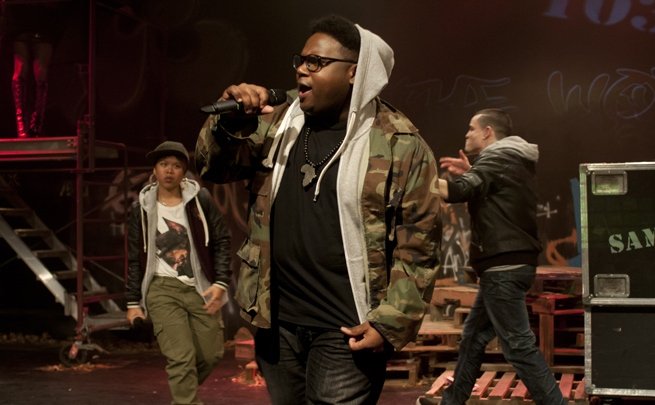
The NAC English Theatre plays that have been in the Azireli Studio have easily been some of the strongest of the season for me, so it was fitting to have Sal Capone: The Lamentable Tragedy Of as the last studio theatre show of the 2017-2018 season. This play was so unbelievably powerful that I’m pretty sure I experienced just about every emotion possible before, during, and after the performance. I have nothing but the highest praise for the team that put this together.
Written by Omari Newton and directed by Diane Roberts, Sal Capone is inspired by the shooting of 18 year old Montreal youth, Freddy Villanueva. Based on real life issues, the play tackled topics that are very relevant to theatre goers. Newton has been working on this play since about 2008, so there have been some edits added including more recent references in the play (such as references to Black Panther, the Black Lives Matter movement, and other social justice issues). But overall, the subject matter of the play has, unfortunately, remained relevant these past ten years. Some of the issues that are tackled within this play are racism, prejudice, homophobia, and police brutality. The situations presented onstage were uncomfortable, but in a good way. These are the kinds of issues that need to be discussed, and that’s just what happened.
At the end of the performance, Newton and the actors of the play came out of stage for a talk-back with the audience. It was really fascinating to hear about everything that went into putting this play together, but I think it was the audience that really added to the performance. Some First Nations audience members had some really interesting insights about the character of the prostitute Shaneyney (played by Troy Emery Twigg). This prostitute was our self proclaimed “Mama” for the performance as she educated us about being witnesses to the things we were seeing on stage. Since Twigg is Blackfoot from the Kainai Nation, these particular audience members interpreted the character of the prostitute as an Agokwe/Two-Spirit character. And given that this character narrates and oversees the action of the play, they said this made Shaneyney a kind of trickster figure who was commenting on all of the injustices that had been committed on the land of the First Nations People. This was an absolutely mind blowing interpretation of the character and I felt it added another layer to this already complex story. I had an immediate desire to watch the play all over again with this new information in mind to see how it would alter my perception of the story.
Just as the aftermath of the play captivated me, so did the pre-show and opening scenes of this performance. The Azireli Studio is a black box theatre, so I am always pleased when performances have more than just a simple proscenium or thrust stage set up. Many of the curtains had been removed from the walls and the space had been opened up on the sides. Actors also ventured into the audience and into the rafters throughout the performance, so the space was really well utilized for this show. The set had a very urban feel and looked like the sort of thing you might see it an alleyway. It was simple, yet effective as the set pieces worked well in each scene with no transformations needed other than changes in lighting and projected images on the walls.
As the audience was wandering in, the actors were sitting around on stage as if we were looking at a street scene. And when the show actually started, they pulled out microphones and treated the audience to a phenomenal rap performance. In addition to excellent acting, this play had rap, poetry, slam poetry, and a capella singing. Letitia Brookes as Naomi Salazar and Jordan Waunch as Chase “Cheddar” Stagnetti did an excellent job, but it was Tristan D. Lalla as Freddie Salazar Jr. and Kim Villagante as Jewel De La Reyas who stole the show for me. Lalla and Villagante proved to be excellent rappers and I was absolutely blown away by their performance.
As fun as this show was at times, it was still very much a tragedy. Even though the events on stage were fictitious, the themes at the heart of this play are still very poignant in the world outside of the theatre. In fact, due to exposure of media and social media coverage of police brutality against black youth, there were moments in the play were the audience knew what was going to happen before it happened, and I think that was the saddest part of it all. When Cheddar, the white boy, was drunkenly waving a gun around, nothing happened. But when Freddie, the black boy, tried to get the gun away from Cheddar to protect everyone, the moment the gun was in his hand everyone in the audience froze. We knew we would hear the police gunshots before it even happened. It’s moments like these that drive discussion in talk-backs, and that should continue to drive discussion outside of the theatre. As “Mama” taught us during the show, we need to be responsible witnesses.


